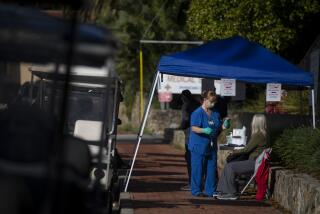Hospital to get a new owner
A rapidly growing Southland hospital chain owned by a controversial cardiologist has agreed to buy struggling Centinela hospital in Inglewood.
The pending acquisition would be the highest-profile purchase yet by Prime Healthcare Services Inc., an Inland Empire-based chain operated by Dr. Prem Reddy.
The chain is buying Centinela Freeman HealthSystem’s Centinela hospital, which promotes itself as the official medical center of the Los Angeles Dodgers and Lakers.
It is the largest of three facilities that make up the Centinela Freeman system.
The struggling 369-bed hospital will be the ninth hospital Prime has acquired throughout the region in recent years.
The Centinela campus treats more than 60,000 emergency room patients and 80,000 outpatients per year and is a key component of South Los Angeles’ healthcare delivery system, especially after the closure of nearby King-Harbor Medical Center in August.
Prime Healthcare said the deal did not include the purchase of two smaller Centinela facilities -- its Memorial campus in Inglewood and its Marina campus in Marina del Rey. The chain’s current owners plan to keep the Marina hospital open although they are trying to sell the third facility, according to company officials.
Reddy said his company planned to acquire more hospitals throughout the region, particularly in Los Angeles County.
Reddy said Prime was considering making a bid for Brotman Medical Center in Culver City, which filed for Chapter 11 bankruptcy protection from creditors last week. Brotman executives have not publicly said the hospital was for sale.
“We will be buying several more hospitals in Southern California,” he said.
Over the last two years, Reddy and his company have launched an aggressive expansion program in Southern California. Six of Prime’s hospitals were bought in the last two years -- including Sherman Oaks Hospital and Huntington Beach Hospital.
As the company has grown, Reddy and his business activities have come under increased scrutiny by state officials, healthcare advocates and patients.
In July, the Los Angeles Times profiled Reddy, chronicled his ascent in the Southern California hospital industry and reported on a wide range of concerns by critics about his company’s practices.
When the company takes over a hospital, it typically cancels the private insurance contracts, allowing the hospital to collect steeply higher reimbursements from insurers. It has also suspended patient services -- such as chemotherapy treatments, mental healthcare and birthing centers -- that are often needed but aren’t lucrative for hospitals.
Prime executives say the company provides superior patient care and scores well on national accreditation surveys. They say the company has only cut services that aren’t commonly used or are available nearby and that its hospitals regularly treats uninsured patients.
Critics contend that Reddy-owned hospitals routinely turn away uninsured patients. Several former employees also have successfully sued Reddy and his current and former companies for firing them after they raised concerns about improper financial practices and patient safety.
“Every hospital we purchase is a hospital that is near bankruptcy or already in bankruptcy. Other than us, those hospitals wouldn’t be existing as hospitals,” Reddy said Wednesday. “I love my patients and my patients know that and they love me.”
In July, the state attorney general’s office declined to approve a $55-million sale of the 223-bed Anaheim Memorial Medical Center to Prime, saying it had concerns about the propriety of the sale process and that the agreement was not in the best interest of Anaheim.
The attorney general must approve the sale of all nonprofit hospitals to for-profit companies. Because Centinela is part of a for-profit chain, its sale to Prime does not need such approval.
Centinela has had a tumultuous recent history. In 2004, Tenet Healthcare Corp. sold all three hospitals to a private investment group, Westridge Capital, which bought the local hospitals along with a group of local investors.
At the time, the group pledged to keep all three emergency rooms open. But the emergency room at Memorial was closed last year and other services were discontinued amid outcries from local officials, patients and advocates.
As more local hospitals and emergency rooms close, particularly in poorer areas such as South Los Angeles, experts are increasingly worried that patients could experience significantly longer waits and won’t have access to critical care services.
Some local officials are concerned that Centinela’s sale and the possible sale of Memorial could cast the area’s healthcare system into more distress.
Because Prime often cancels insurance contracts, making it more difficult for insured patients to use the hospital, access to medical care is made more difficult. A sale of the Memorial campus could further decrease access, critics said, especially if the hospital sold to a developer and used for real estate.
“I’d like to know what Centinela’s new owner plans and what will happen to the other two facilities. I feel some sort of action needs to be taken to ensure this community isn’t the victim in the end,” Inglewood City Councilman Daniel Tabor said.
Hours after announcing its new purchase Wednesday, Prime was hit with a setback to its expansion plan on another front.
The company submitted a new bid for Anaheim Memorial early last month, but the hospital’s parent company, Memorial Health Services of Huntington Beach, said Wednesday that it had selected Integrated Healthcare Holdings Inc. of Anaheim to purchase the medical center.
andrea.chang@latimes.com






